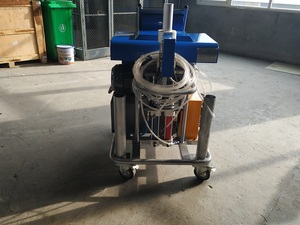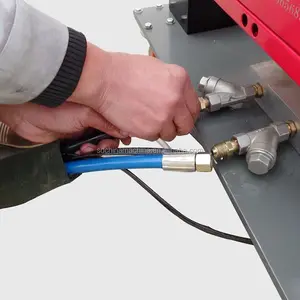(318 products available)






























































































































































































































A foam insulation machine is a specialized piece of equipment used to apply spray foam insulation. It typically combines and sprays the two components of spray foam insulation: the isocyanate and the polyol resin. Here are some common types of foam insulation machines.
Greencoat Machine
The GreenCoat machine is primarily designed for spraying recycled materials and insulation foam. It is lightweight, making it easy to carry and transport. Despite its small size, it features a Titan airless pump that delivers powerful performance. Additionally, the machine comes with a variable-speed Blower Motor and an E-Box that ensures efficient engine control.
SPF Insulation Machine
This type of machine is widely used for high-density foam applications, including insulation and sealing. Spray Foam Equipment Insulation Machines offer numerous options to meet specific needs. They provide a carefully controlled "room to grow" variable-density insulation that sets quickly, sealing even the smallest cracks and providing a consistent level of insulation throughout.
Eco Spray Foam Machine
The Eco Spray Foam Machine is lightweight, compact, and efficient, primarily used for the application of spray foam. It features a 2- or 5-gallon double wall tank, a 12-volt foam pump, and a polyester pump. The machine is capable of spraying open-cell and closed-cell spray foam insulation, as well as roofing foam and coating.
EF2600 Hybrid Insulation Machine
The hybrid machine is small, light, and easy to operate in confined areas or overhead applications. Some of its features include a digital control system, multiple insulation material compatibility, a high-output foam pump, and a compact design. It combines the benefits of both pneumatic and electric machines, making it more versatile for different job requirements.
DM-11 Variable Speed Spray Foam Machine
This is a complete, high-performance spray foam insulation machine designed for the professional insulator. It features a digital temperature control system and operates on 240 volts of single-phase electricity, with a maximum spray output of 15.0 lbs. per minute.
The specifications for the foam insulation dispenser vary according to the type of machine or equipment and the manufacturer. Here are some general specifications.
The continuous foaming machine needs periodic maintenance and servicing to keep it in good operating condition and ensure that it works optimally. Here are some maintenance tips.
Foam insulation machines are used in the construction industry to create insulating foam for various applications. The construction industry relies heavily on foam insulation machines to insulate buildings. This includes wall insulation, roof insulation, floor insulation, irregular cavities, and soundproofing. Foam insulation machines are also used in the packaging industry for protective packaging, such as cushion packaging, transit packaging, and custom packaging solutions. In the automotive industry, insulation machines assist in manufacturing insulated vehicles. Foam insulation machines also make insulated containers and cans in the food and beverage industry. The cold chain logistics industry uses foam insulation machines to create refrigerated containers and boxes. Other industries that use foam insulation machines include electronics, typically to provide thermal insulation for electric devices, medical, to manufacture medical equipment insulation, and aerospace, to produce aircraft insulation.
It is important to choose the right foam insulation machine manufacturer or supplier. Buyers should research different suppliers and select a well-known manufacturer that offers high-quality products. Buyers can check if the supplier has a quality certification system like ISO 9000. This shows that they are serious about providing good products and services. The foam insulation machine buyer can also read reviews from other customers to understand better the supplier's service and product quality. Choose a supplier who gives good after-sales service and support. This means they will help customers even after selling the product to them. Some suppliers offer to customize equipment to meet specific business needs. If this is essential, buyers should ensure that the supplier has good capabilities. Finally, buyers should visit the supplier's facilities if possible to see the production process. This will help to gain better faith in the supplier's product quality.
Q1: What kind of support will a spray foam insulation machine supplier offer after purchase?
A1: Spray foam insulation suppliers often provide business buyers with comprehensive after-sales support. This support ranges from equipment installation and training to technical assistance and frequent maintenance services. Some suppliers may also provide warranties on their machines for added customer reassurance.
Q2: Can a supplier of foam insulation machines offer training on how to use the equipment?
A2: Yes, many suppliers offer training on how to operate, maintain, and safely handle the spray foam insulation equipment they supply. This training may be provided on-site at the buyer's location or at the supplier's facilities.
Q3: Do insulation foam suppliers sell different types of spray foam insulation?
A3: Yes, different types of spray foam insulation are available to buyers. The two primary categories are closed-cell and open-cell spray foam insulation. Generally, open-cell spray foam is less expensive than closed-cell. A foam machine supplier can provide more information on the differences.
Q4: What type of foam insulation do professionals use?
A4: Closed-cell spray foam insulation is commonly used by professionals due to its high R-value, moisture barrier characteristics, and structural support. However, open-cell spray foam insulation is also used depending on the specific requirements of a project.
Q5: Can buyers get custom foam insulation machines from a supplier?
A5: Yes, buyers can often get customized foam insulation machines according to their specific needs from a supplier. Customization options may include modifying the machine's capacity, features, and configurations.